The total daily energy expenditure reflects the daily energy requirements. It is an important variable in human health and physiology. Nevertheless, its pattern over the life course is poorly studied.
Herman Pontzer, Duke University, Durham, NC, USA, and colleagues have studied, for the first time, changes in total calorie consumption in 6,421 women and men from 29 different countries and ages ranging from eight days to 95 years.
The researchers distinguished four life stages: Fat-free mass-adjusted consumption accelerates rapidly in newborns and is about 50 % above adult levels by about one year of age. It slowly declines to adult levels by ~20 years of age. In adulthood, calorie consumption remains stable. Between the ages of 20 and a good 60, there is virtually no change in total metabolic rate. Even during pregnancy or menopause in women, the weight-related metabolism remains at this plateau.
It is not until the average age of 63 that the next phase begins: Calorie consumption drops by around 0.7 % per year. This gradual slowdown means that a 90-year-old person needs about 26 % fewer calories than a middle-aged adult. Contrary to what previously was thought, however, this decrease in total metabolic rate is not related to age-related loss of muscle mass. The decrease is because the cells slow down their metabolism.
These changes shed light on human development and aging and should help inform nutrition and health strategies across the lifespan.
- Daily energy expenditure through the human life course,
Herman Pontzer, Yosuke Yamada, Hiroyuki Sagayama, Philip N. Ainslie, Lene F. Andersen, Liam J. Anderson, Lenore Arab, Issaad Baddou, Kweku Bedu-Addo, Ellen E. Blaak, Stephane Blanc, Alberto G. Bonomi, Carlijn V. C. Bouten, Pascal Bovet, Maciej S. Buchowski, Nancy F. Butte, Stefan G. Camps, Graeme L. Close, Jamie A. Cooper, Richard Cooper, Sai Krupa Das, Lara R. Dugas, Ulf Ekelund, Sonja Entringer, Terrence Forrester, Barry W. Fudge, Annelies H Goris, Michael Gurven, Catherine Hambly, Asmaa El Hamdouchi, Marjije B. Hoos, Sumei Hu, Noorjehan Joonas, Annemiek M. Joosen, Peter Katzmarzyk, Kitty P. Kempen, Misaka Kimura, William E. Kraus, Robert F. Kushner, Estelle V. Lambert, William R. Leonard, Nader Lessan, Corby Martin, Anine C. Medin, Erwin P. Meijer, James C. Morehen, James P. Morton, Marian L. Neuhouser, Teresa A. Nicklas, Robert M. Ojiambo, Kirsi H. Pietiläinen, Yannis P. Pitsiladis, Jacob Plange-Rhule, Guy Plasqui, Ross L. Prentice, Roberto A. Rabinovich, Susan B. Racette, David A. Raichlen, Eric Ravussin, Rebecca M. Reynolds, Susan B. Roberts, Albertine J. Schuit, Anders M. Sjödin, Eric Stice, Samuel S. Urlacher, Giulio Valenti, Ludo M. Van Etten, Edgar A. Van Mil, Jonathan C. K. Wells, George Wilson, Brian M. Wood, Jack Yanovski, Tsukasa Yoshida, Xueying Zhang, Alexia J. Murphy-Alford, Cornelia Loechl, Amy H. Luke, Jennifer Rood, Dale A. Schoeller, Klaas R. Westerterp, William W. Wong, John R. Speakman,
Science 2021, 373, 808–812.
https://doi.org/10.1126/science.abe5017



